Nuclear talks resume in Vienna more than five months later

If one has to look at what happened in Vienna from April to June for the resumption of the nuclear talks, optimism is not in the air. The three months spent negotiating a return to the Joint Comprehensive Plan of Action (JCPOA) served for little more than nothing at all. Far from coming closer together and giving in, both sides showed no flexibility, and Iranian and US demands ended up scuppering the efforts of all the countries at the negotiating table.
Elections in Iran have prolonged the waiting time to return to Vienna and continue the search for an agreement that satisfies all parties. The arrival of Ebrahim Raisi in power is a change from the last time they met in the Austrian capital. However, even if the new Iranian president's stance is more conciliatory - something that remains to be seen - progress on the Iranian nuclear plan will make it even more complicated to reach a meeting point with Washington, which is demanding an immediate halt to uranium enrichment.

Tehran is very clear that US demands will not be accepted until it sees a reduction in the sanctions imposed in recent years. After the unilateral exit of the United States under the presidency of Donald Trump in 2018, the sanctions on the Iranian government have been a constant that have only led to the anger of those in Raisi, who have systematically violated the restrictions imposed by the agreement signed in 2015. The latest data to which the International Atomic Energy Agency (IAEA) has had access indicate that Iran is enriching uranium to a purity of 60%, when the JCPOA set the limit at 3.67%, that is, they are enriching to a purity 16 higher than permitted.

However, initial statements by Iranian officials are not very encouraging: "Our demands are clear. Other parties and especially the Americans should decide whether they want this deal to be revived or not. They abandoned the deal, so they should go back to it and lift all sanctions," an Iranian official told Reuters. The withdrawal of sanctions by the Biden administration does not seem likely to happen, at least not completely as Tehran is demanding. What must be borne in mind is that time is not on the side of the EU and the United States as the talks drag on, while the Iranian nuclear plan continues to move forward.
On Saturday, the US representative at the talks, Robert Malley, told BBC Sounds that "if Iran thinks they can use this time to generate more leverage and then come back and say they want something better, it's just not going to work. We and our partners won't accept that". Washington wants to put more pressure on Tehran, but the Iranians do not seem overly concerned. Prior to their arrival in Vienna they have repeated on numerous occasions that their main objective in these negotiations is not to address the nuclear issue, but the sanctions issue.

The situation has not become any less complex since the negotiations were abandoned in June this year - quite the contrary. Iran is not only bending every rule in the book, it is also showing its most hypocritical side: "To ensure that any future deal is ironclad, the West must pay a price for not keeping its side of the bargain. As in any business deal, a deal is a deal, and breaking it has consequences," said Iran's chief negotiator Ali Bagheri Kani in a column in Sunday's Financial Times.

The position shared by the vast majority of countries is that expressed by Moscow's envoy, who said on his Twitter account that "the talks cannot go on forever", adding that "there is an obvious need to speed up the process". And if there is such a need it is largely because the IAEA has reported that Iran's return to the negotiating table comes with 11 times more enriched uranium than the JCPOA allows. The need for a new agreement grows by the day and the responsibility of the international community is not to leave Vienna without a deal that guarantees nuclear security.








